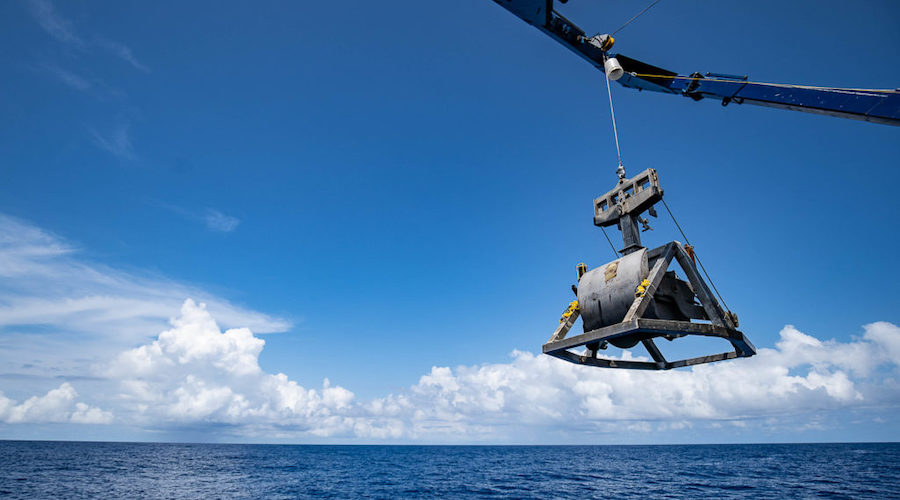Anti-deep sea mining rally held on Ocean’s Day

A deep-sea mining pilot expected to occur later this year 1,300 nautical miles southwest of Sandiego, California was the subject of a rally in Vancouver Wednesday.
Wednesday was Oceans Day, and one of the companies blazing a path in the new frontier of deep ocean mining – The Metals Company (Nasdaq:TMC) — is incorporated in the Cayman Islands but headquartered in Vancouver.
Two of its early investors are from Vancouver — mining mogul Frank Giustra and Brian Paes-Braga, founder of Lithium-X (TSX-V:LIX), which he sold in 2018 for C$265 million ($209m).
The Metals Company was formed last year through a C$2.9 billion ($2.29bn) merger between Vancouver’s DeepGreen Metals with a special-purpose acquisitions company, Sustainable Opportunities Acquisition Corp.
The company’s stock hit a high of $12.45 September 13, 2021, but has since fallen to $1.42 – perhaps a reflection of just how risky investors consider this new process for mining the ocean floor for minerals may be. No one has yet done it on a commercial scale.
The company and its technology partner, Allseas, recently marked the commissioning of key components of the underwater mining system that will be used to scoop up metals-rich pollymetallic nodules laying on the ocean floor in an area known as the Clarion Clipperton Zone between Hawaii and Mexico.
The company also released video of the trials of the collector vehicle designed to comb the ocean floor, scooping up the nodules and pumping them to a platform on the surface of the ocean.
“This latest development builds upon earlier successful trials of the nodule collector vehicle in deep-water in the Atlantic as well as harbour wet testing and shallow-water drive tests in the North Seas, and comes in advance of full pilot nodule collection trials…in the Clarion Clipperton Zone of the Pacific Ocean later this year,” the company says in a news release.
Deep ocean mining is governed by the International Seabed Authority (ISA), which has estimated that there could be 21 billion of tonnes of polymetallic nodules in the Clarion Clipperton Zone between Hawaii and Mexico, containing an estimated six billion tonnes of manganese, 234 million tonnes of copper, 270 million tonnes of nickel and 46 million tonnes of cobalt.
These metals are critical for making batteries, the demand for which is soaring for electric vehicles. The International Energy Agency (IEA) has estimated a sixfold increase in critical metals, including battery metals, will be needed to fuel the energy transition over the next decade, and there are concerns that terrestrial mines simply can’t be built in time to meet the demand.
The Metals Company holds exploration and commercial rights in the zone and has royalty agreements with three Pacific Island Nations — Tonga, Kiribati and Nauru. The company’s industrial and technology partners include Maersk and the Allseas Group S.A., a Swiss company that developed the harvesting machine that will be used.
Last year the company released an environmental impact report. It notes that the Abyssal Plain where the nodules would be harvested is at a depth of 4 to 6 kilometres, and is relatively barren.
“Less than 10% of all marine life lives below 4,000 meters,” the report notes. “The abyssal plain is a very challenging place for organisms to live because of the enormous pressure, the lack of light and the poor availability of food at these depths. There are no plants.
“A few large mobile species such as ratfish and shrimp do live on the abyssal plain and can swim, so they will be able to move away from the areas disturbed by nodule collection.”
Despite those assurances, Michelle Connolly, a project manager for Ecotrust Canada, says deep sea mining could put marine life at risk.
“We want to stop deep sea mining before it starts,” she said in a news release. “There is a rising demand for minerals for electric cars and other technologies. We do not believe that putting ocean life at risk for energy is acceptable.”
(This article first appeared in Business in Vancouver)
{{ commodity.name }}
{{ post.title }}
{{ post.date }}




Comments
Steve
History is littered with mining related pollution on land and as someone who works in the industry even I ask, why would we even consider letting anyone do the same in our oceans?